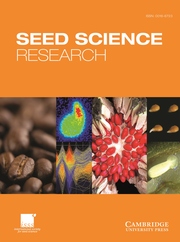Crossref Citations
This article has been cited by the following publications. This list is generated based on data provided by
Crossref.
An, Chuanfu
Jenkins, Johnie N.
Wu, Jixiang
Guo, Yufang
and
McCarty, Jack C.
2010.
Use of fiber and fuzz mutants to detect QTL for yield components, seed, and fiber traits of upland cotton.
Euphytica,
Vol. 172,
Issue. 1,
p.
21.
Lin, Lifeng
Pierce, Gary J
Bowers, John E
Estill, James C
Compton, Rosana O
Rainville, Lisa K
Kim, Changsoo
Lemke, Cornelia
Rong, Junkang
Tang, Haibao
Wang, Xiyin
Braidotti, Michele
Chen, Amy H
Chicola, Kristen
Collura, Kristi
Epps, Ethan
Golser, Wolfgang
Grover, Corrinne
Ingles, Jennifer
Karunakaran, Santhosh
Kudrna, Dave
Olive, Jaime
Tabassum, Nabila
Um, Eareana
Wissotski, Marina
Yu, Yeisoo
Zuccolo, Andrea
ur Rahman, Mehboob
Peterson, Daniel G
Wing, Rod A
Wendel, Jonathan F
and
Paterson, Andrew H
2010.
A draft physical map of a D-genome cotton species (Gossypium raimondii).
BMC Genomics,
Vol. 11,
Issue. 1,
Paterson, A. H.
2010.
Cotton.
Vol. 65,
Issue. ,
p.
45.
Hinze, Lori
and
Kohel, Russell
2012.
Technological Innovations in Major World Oil Crops, Volume 1.
p.
219.
Yu, Jiwen
Yu, Shuxun
Fan, Shuli
Song, Meizhen
Zhai, Honghong
Li, Xingli
and
Zhang, Jinfa
2012.
Mapping quantitative trait loci for cottonseed oil, protein and gossypol content in a Gossypium hirsutum × Gossypium barbadense backcross inbred line population.
Euphytica,
Vol. 187,
Issue. 2,
p.
191.
Mehboob-ur-Rahman
Shaheen, Tayyaba
Tabbasam, Nabila
Iqbal, Muhammad Atif
Ashraf, Muhammad
Zafar, Yusuf
and
Paterson, Andrew H.
2012.
Cotton genetic resources. A review.
Agronomy for Sustainable Development,
Vol. 32,
Issue. 2,
p.
419.
Toubiana, David
and
Fait, Aaron
2012.
Seed Development: OMICS Technologies toward Improvement of Seed Quality and Crop Yield.
p.
453.
Liu, H. Y.
Quampah, A.
Chen, J. H.
Li, J. R.
Huang, Z. R.
He, Q. L.
Shi, C. H.
and
Zhu, S. J.
2012.
QTL analysis for gossypol and protein contents in upland cottonseeds with two different genetic systems across environments.
Euphytica,
Vol. 188,
Issue. 3,
p.
453.
ALFRED†, QUAMPAH
LIU†, HAI YING
XU, HAI MING
LI, JIN RONG
WU, JIAN GUO
ZHU, SHUI JIN
and
SHI, CHUN HAI
2012.
Mapping of quantitative trait loci for oil content in cottonseed kernel.
Journal of Genetics,
Vol. 91,
Issue. 3,
p.
289.
Bechere, Efrem
Turley, Rick B.
Auld, Dick L.
and
Zeng, Linghe
2012.
A New Fuzzless Seed Locus in an Upland Cotton (<i>Gossypium hirsutum</i> L.) Mutant.
American Journal of Plant Sciences,
Vol. 03,
Issue. 06,
p.
799.
Harrison, Jay M.
Howard, Delia
Malven, Marianne
Halls, Steven C.
Culler, Angela H.
Harrigan, George G.
and
Wolfinger, Russell D.
2013.
Principal Variance Component Analysis of Crop Composition Data: A Case Study on Herbicide-Tolerant Cotton.
Journal of Agricultural and Food Chemistry,
Vol. 61,
Issue. 26,
p.
6412.
Liu, Haiying
Quampah, Alfred
Chen, Jinhong
Li, Jinrong
Huang, Zhuangrong
He, Qiuling
Zhu, Shuijin
Shi, Chunhai
and
Zhang, Tianzhen
2013.
QTL Mapping Based on Different Genetic Systems for Essential Amino Acid Contents in Cottonseeds in Different Environments.
PLoS ONE,
Vol. 8,
Issue. 3,
p.
e57531.
Zhang, Xingju
Yuan, Yanchao
Wei, Ze
Guo, Xian
Guo, Yuping
Zhang, Suqing
Zhao, Junsheng
Zhang, Guihua
Song, Xianliang
Sun, Xuezhen
and
Fang, David D.
2014.
Molecular Mapping and Validation of a Major QTL Conferring Resistance to a Defoliating Isolate of Verticillium Wilt in Cotton (Gossypium hirsutum L.).
PLoS ONE,
Vol. 9,
Issue. 4,
p.
e96226.
Hinze, Lori L.
Horn, Patrick J.
Kothari, Neha
Dever, Jane K.
Frelichowski, James
Chapman, Kent D.
and
Percy, Richard G.
2015.
Nondestructive Measurements of Cottonseed Nutritional Trait Diversity in the U.S. National Cotton Germplasm Collection.
Crop Science,
Vol. 55,
Issue. 2,
p.
770.
BADIGANNAVAR, ASHOK
and
MYERS, GERALD O.
2015.
Genetic diversity, population structure and marker trait associations for seed quality traits in cotton (Gossypium hirsutum).
Journal of Genetics,
Vol. 94,
Issue. 1,
p.
87.
Liu, Guizhen
Mei, Hongxian
Wang, Sen
Li, Xinghe
Zhu, Xiefei
and
Zhang, Tianzhen
2015.
Association mapping of seed oil and protein contents in upland cotton.
Euphytica,
Vol. 205,
Issue. 2,
p.
637.
Fang, Weiping
Xie, Deyi
Zhu, Heqin
Li, Wu
Xu, Zhenzhen
Yang, Lirong
Li, Zhifang
Sun, Li
Wang, Jinxia
Nie, Lihong
Tang, Zhongjie
Lv, Shuping
Zhao, Fu’an
Sun, Yao
Zhao, Yuanming
Hou, Jianan
and
Yang, Xiaojie
2015.
Comparative Proteomic Analysis of Gossypium thurberi in Response to Verticillium dahliae Inoculation.
International Journal of Molecular Sciences,
Vol. 16,
Issue. 10,
p.
25121.
Liu, Dexin
Liu, Fang
Shan, Xiaoru
Zhang, Jian
Tang, Shiyi
Fang, Xiaomei
Liu, Xueying
Wang, Wenwen
Tan, Zhaoyun
Teng, Zhonghua
Zhang, Zhengsheng
and
Liu, Dajun
2015.
Construction of a high-density genetic map and lint percentage and cottonseed nutrient trait QTL identification in upland cotton (Gossypium hirsutum L.).
Molecular Genetics and Genomics,
Vol. 290,
Issue. 5,
p.
1683.
Manickam, S
and
Prakash, A. H.
2016.
Gene Pool Diversity and Crop Improvement.
Vol. 10,
Issue. ,
p.
105.
Kothari, Neha
Campbell, B. Todd
Dever, Jane K.
and
Hinze, Lori L.
2016.
Combining Ability and Performance of Cotton Germplasm with Diverse Seed Oil Content.
Crop Science,
Vol. 56,
Issue. 1,
p.
19.

